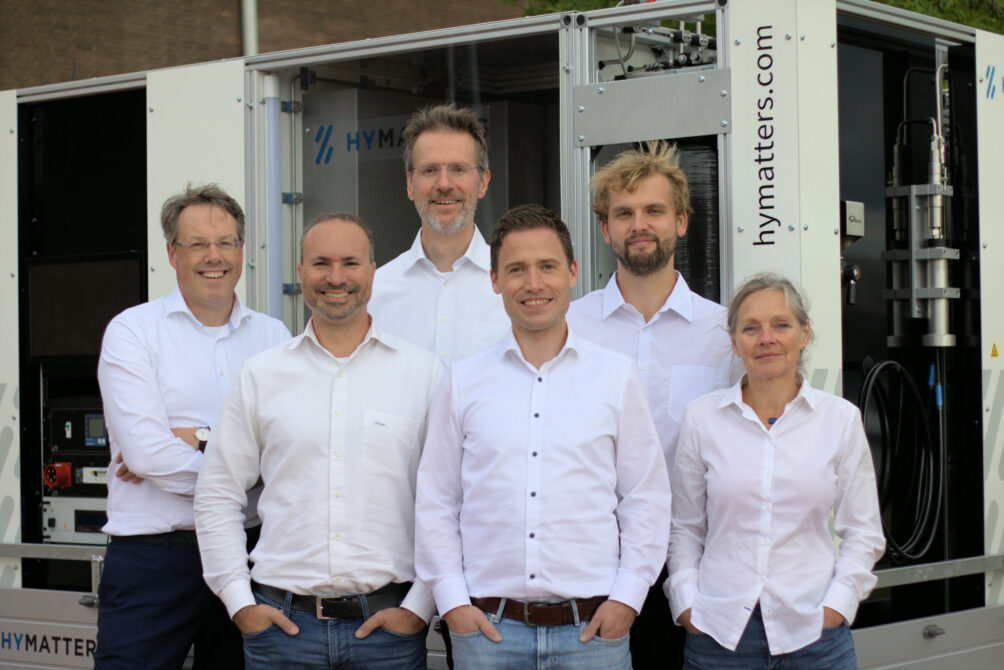
About HyMatters
- Founders: Jerom Janssen, Dick Breteler en Edwin Tazelaar
- Founded in: 2018
- Employees: 6
- Money raised: -
- Ultimate goal: netverzwaring uitstellen en voorkomen door duizenden units in Nederland te plaatsen
Hydrogen: it could be the solution to rising energy bills, appliances that break down due to too much electricity, and too many CO2 emissions. Start-up HyMatters – located at the Arnhem Kleefse Waard – focuses on companies struggling with these problems and eager to become more sustainable. In this episode of Start-up of the day, co-founder Jerom Janssen talks more about the now four-year-old start-up.
What is HyMatters?
“We are a start-up that wants to make green, sustainable hydrogen practical for companies that want to eliminate natural gas and diesel. In other words: companies that want more control over their energy consumption. As a company, do you want less CO2 emissions? Then we can help you. Do you want to get rid of diesel explicitly? Then we can help you too. Are you a property operator, and the energy label of a property is no longer good? Come talk to us.”

What exactly do you guys do?
“We do two things as a company: consultancy and making hardware solutions. With consultancy, we help a company get initial insights and can create a design that is beneficial for their energy use. Should hydrogen be a possible solution, we will look for hardware solutions. So we don’t want to help everyone get hydrogen: we first see if hydrogen is suitable for a company.”
What exactly does a “hardware solution” entail?
“We then offer people our device. We have created a device that can produce hydrogen. Part of the innovation of that is that it is a device that is on a trailer. With our equipment, we can make hydrogen in two ways: we make as much as we can per day, or we produce it only when there is a surplus of renewable electricity. The equipment measures the mains voltage, and you can set the maximum number of volts it can get. If it threatens to get higher, the device starts working faster and faster to get that voltage down by producing hydrogen.”
Why is the device on a trailer?
“This way, it is easily transportable. This allows us to figure out the right places to put the units, often near a transformation house. If the equipment is placed in different and the right places, there will be fewer high peaks and fewer deep valleys in electricity storage. Also, you don’t have to dig up all of the Netherlands to lay cables everywhere.”

What problem are you trying to solve?
“If there is a surplus of electricity, it cannot be used fast enough. This can cause equipment to break down, for example. For you and me, that’s not such a problem: if your TV breaks down after four years, we don’t notice that maybe that surplus was the cause. But for example, for equipment used in hospitals for MRI scans, that’s a different story. First, that is very expensive equipment: you can even buy a house for it. Second, if it fails, the primary hospital process can no longer continue. Also, hydrogen is a gas with no CO2 emissions. That is advantageous, for example, on construction sites where you are not allowed to produce CO2 emissions.”

What do you want to achieve?
“We want to build thousands of units with our equipment and place them throughout the Netherlands. We want to prevent or at least postpone grid reinforcement with this. We also want to increase the knowledge about hydrogen and energy management. We want to train people in this, and we are already doing that by giving hydrogen courses in cooperation with the Arnhem and Nijmegen University of Applied Sciences (HAN). In the future, we hope to enter into more such collaborations.”
Why choose hydrogen as a company?
“Unlike petroleum or diesel, an excess of hydrogen is not a problem: you can store it without consequences. Compare it to a piggy bank for your household: this month, you save some money, and that’s how you get closer to your goal. That your car breaks down next month, and you need money from that pot, is no problem: you have the amount anyway. So you put the excess hydrogen into your “piggy bank”. This makes the electricity market more predictable and allows energy prices to stabilize. You can invest more in advance because you know what your energy consumption will look like. That makes you less vulnerable as a company. Moreover, storing hydrogen is cheaper than storing petroleum. And if hydrogen dissolves, that’s not a problem either: with that, it mimics the ecological process cycle because it becomes water again.”








